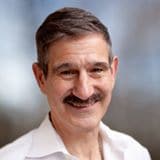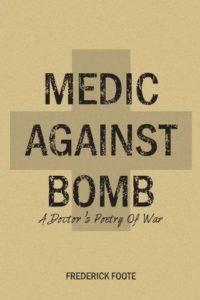Today, in Part 2 of our interview, poet and physician Fred Foote talks with Maureen Doallas about using poetry to heal the psychic wounds of war. He discusses specifically the concept of holistic medicine and the launching of the Warrior Poetry Project that he directs at Walter Reed National Military Medical Center in Bethesda, Maryland. Part 3, which will conclude the interview, will examine some of Foote’s other arts initiatives, including the Green Road Project, a nature-based project for veterans. (A retired U.S. Navy captain, Foote’s statements are entirely his own and should not be considered as representing the views of the U.S. Government.)
You describe the holistic approach to healing as “a new kind of medicine.” What piques your interest in holistic medicine?
Conventional medicine treats a single-organ system with pills or surgery. Holistic care refers to “whole-body” therapies, such as “healing buildings”, family engagement, integration of care, basic wellness (nutrition, exercise, and alternative medicine), and advanced wellness (use of nature, art, and spirituality in healthcare). I’ve done projects in all of these areas during my years at Walter Reed.
Post-traumatic stress disorder (PSTD) and brain injury (TBI) are whole-person disorders, because they affect every aspect of a person’s life and functioning. In addition, medications and surgery, the main tools of conventional care, don’t work well alone in PSTD and TBI.
The best care combines both approaches.
You currently direct the Warrior Poetry Project (WPP), which you developed as part of the Warrior Arts Program at Walter Reed. What was involved in creating the poetry project and integrating it with the greater arts program at Walter Reed?

With help of an extensive staff, including three paid coordinators and more than a dozen paid artists-in-residence, as well as many therapists and volunteers, nearly all our Wounded Warriors make art or music during their stay at Walter Reed.
The next step in the program is to spread the modalities to communities outside the hospital. We’re starting that this year with the Maryland Network of Arts and Gardens for Veterans (MNAG-V)—locally managed arts lessons and garden projects for veterans across the state. It’s run by the Institute for Integrative Health in Baltimore. We are interviewing for a state coordinator for the program [information about the position is under “Careers” at the bottom on the TIIH homepage].
Has the Warrior Poetry Project ever been a tough sell to the veterans receiving care at Walter Reed?
We let the students control what and how they write. They learn at once that [the project] has healing effects.
What is the role of family members in the WPP?
We offer a wide-open door to participation. Friends, families, fellow-travelers—all are welcome.
Who outside Walter Reed is involved in the project?
I bring in guest teachers for some topics. (You don’t want me teaching you how to rap!)
Do participants write poems primarily about their military service or does the project encourage creative writing outside the genre of “war poetry”?
We write about any topic. Students tackle war issues when they are ready to.
Technology advances have changed how wars are fought but not their devastating effects on service personnel and families. Do veterans today write poetry that differs in any way from poetry written during or after, say, World Wars I and II or the Vietnam War?
Some of modern poetry sacrifices passion to irony and technique. War makes it easier to respond to passion. To me, that’s a renewal of integrity.
What do you believe to be the most important quality or qualities you and your staff bring to the poetry-writing project?
Just a trust in telling the truth.
What part of the poetry-writing project do you most enjoy, and why?
I like the students’ successes. A number [of the veterans] have published poems from the project, and we recently got our first enrollee into a full-time M.F.A. program.
What are your goals for WPP, and how has the project evolved or changed since its inception in 2011?
Last winter we took the project off-base to a local restaurant two nights a month, creating the Warrior Arts Café. We brought our artists together with other veterans and the community; it was a great success. We’re down for the summer but will resume in the fall. [Read an article about Warrior Arts Café.]
What do you count as some of the poetry project’s successes? How are these results measured and documented, especially for research purposes on the therapeutic effects of the arts?
[We have] no research yet but we are working on that, for the entire Walter Reed arts program and the Maryland network.
Are the veterans who participate in the arts activities being followed long-term to assess how the arts over time have affected recovery and healing?
That’s very important. We’re building that infrastructure now.
Do you know if any of your initiatives have been replicated for Iraqi or Afghani soldiers suffering from the same kinds of injuries as Americans sustained?
I’m not aware of any but it’s a good idea.
What is the most extraordinary event you’ve witnessed during one of your poetry-writing workshops?
Home-made Thai food from one of the spouses!
[. . .]
Over the pitching seas,
I watch before the dawn
the helos crouching down,
the files of tense Marines.
They’re going behind the lines,
moving from ship to land;
Medicals overmanned:
this time I’m left behind. [. . .]
—Excerpt from “Night Mission” in Medic Against Bomb
They say everything’s been written: it hasn’t.
Darkness and light are vast, and poets have barely begun.
Even when it hides, the hand knows when it’s writing a final
death.
—Excerpt from “Uncle Jim” in Medic Against Bomb
Photo by PS Lee, Creative Commons license via Flickr. Interview by Maureen E. Doallas, author of Neruda’s Memoirs: Poems. Poems by Fred Foote, used with permission.
Foote wishes to make clear that as a retired military veteran and not a federal employee, nothing he shares with readers should be considered to represent the views of the U.S. Government.
________________
For further reference:
- Part 1 of Healing with Poetry Interview
- Frederick Foote Website
- Selection of Fred Foote’s Iraq Poems
- Medic Against Bomb Website
- Fred Foote on Facebook and Twitter
- Fred Foote National Endowment for the Arts Interview
- The Green Road at Nature Sacred
- Wounded Warrior Care Center at Walter Reed National Military Medical Center
In Part 3, coming next week, Foote discusses the Green Road Project for veterans and how the public can help their communities’ own veterans recover from their war experiences.
______________________________

“How to Write a Poem is a classroom must-have.”
—Callie Feyen, English Teacher, Maryland
- Persecuted Poets: Hearing the Voices Beyond Our Borders - November 30, 2016
- Writing with Matisse in Mind - October 26, 2016
- Healing with Poetry: Interview with Fred Foote (Part 3) - September 10, 2015


Dolly Lee says
Maureen,
Your observation struck me: “Technology advances have changed how wars are fought but not their devastating effects on service personnel and families.” And Foote’s observation: “Just a trust in telling the truth.” Wow…the power of truth in art creating healing and freedom…Thank you for highlighting this important work.
Maureen says
Dolly, thank you for reading and commenting. It is important work, and I very much enjoyed learning more about it. I hope more veterans will be able to discover the value of poetry and the arts more generally.
If you haven’t read Brian Turner’s excellent collections of poetry and his more recent memoir, take a peek.